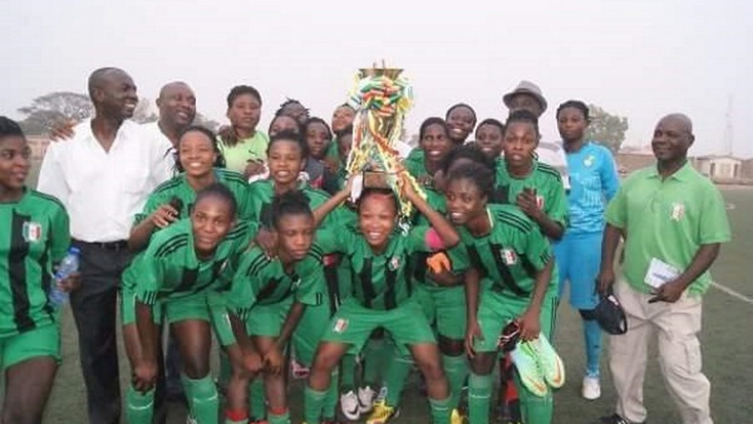The global pandemic which brought worldwide football to a halt did not spare the 2019/20 Ghana Women’s Premier League.
The thought of cancelling an active Women's League was unbearable after factoring all the hard work that went into it. However, the aftermath has been a huge boost to the elite women’s clubs.
Though the big question remains as to whether these clubs would take advantage of the period to assess other sources of revenue streams?
The Youth Employment Agency (YEA), enrolled five hundred women footballers and coaches in the elite league for the six months with each player expected to take home GHS 500 effective July 2020.
Furthermore, the Ghana Football Association (GFA), on Wednesday, July 15 disbursed $160,000 from the FIFA COVID-19 relief fund which saw each of the 16 clubs receiving $10,000 equivalent to GHS 57,631.32 in their coffers.
There was more icing on the cake as the GFA decided to use $26,000 to register 50 players and club officials on the National Health Insurance scheme.
With all these monies and resources pumped into the efforts of women’s football with the aim of developing interest and providing basic needs to the clubs and players, what should be expected from club officials in return?
Reporting first-hand on the league for a while has exposed me some of the grassroots problems facing our clubs. In order to sustain the recent momentum and growth of women’s football in Ghana, there are a number of swift and decisive factors that need to be considered.
One of the elementary factors hampering female football in Ghana has been the players’ welfare. In the elite division of women's football, players are often offered short-term contracts. The duration of agreements reached with these players is a testimony of lack of confidence in the women's game.
It shows how investors do not see engagements with players as a long-term investment; some say, the long contracts are not favourable because some players could get pregnant.
This in a sense affects the state of mind, coupled with other occurrences such as juggling other jobs as well as family responsibilities alongside their football careers. All the aforementioned factors affect the welfare of the players in the women's league.
If the men's game, seen to be better of suffered enormously from the pandemic, then issues surrounding well-being might be felt more acutely in women’s football.
The entire football industry suffered financially, but the women's game was over-distressed, leading to clubs ignoring their players' welfare.
With the YEA programme providing monthly stipends, albeit not enough, the provided funds from the FA will ease the pressure on the clubs to support other sectors of the team such as; viewing women’s football as a core business and not a goodwill gesture to the community, hence, taking their branding and marketing game a further level.
Now, if you have a team or an organisation which is not active on the internet including social media, then it’s more like lighting a candle and putting it under a basket because no one will see you.
Unfortunately, with the 16 female clubs in Ghana, none of them owns an active club website, which will provide information about their players and also be a source to generate revenue when the site gets visited.
The few clubs active on social media are strictly obeying a mandate from the Women’s League board. The interest in keeping their fans informed and entertained wasn't genuine as those activities ended once the league was cancelled.
Most of our female teams do not value a strong media team to keep archives of their data.
Hardly, will a journalist get a video or pictures and statistics from the clubs.
Part of this fund should be diverted into providing basic logistics to make such content available for the media and followers on social media.
The availability of such content in the public markets players to the global football industry. YouTube sold Justin Bieber to the world, and such free platforms should be utilised.
It is also prudent that, clubs invest in the outlook of their players by acquiring kits and other apparels to create uniformity in their setups, as brands will strengthen due to that.
An attractive appearance could interest the corporate world. The haphazard appearance is sometimes obnoxious and could put off investors.
The future of Women's football looked uncertain, but Covid-19 has been a blessing in disguise; providing teams with funds and enough time to ponder on how to move the game to the next level.
For more updates on sporting news, follow #JoySports on Twitter (@joysportsgh) and Instagram (@JoySportsGH)
Latest Stories
-
Expansion Drive: Takoradi Technical University increases faculties
1 hour -
SHS heads demand payment of outstanding funds before reopening of schools
2 hours -
We thank God for the 2024 general elections – Akufo-Addo
2 hours -
Coconut Grove Beach Resort marks 30 years of excellence with memorable 9 lessons & carols service
2 hours -
WAFU B U-17 Girls’ Cup: Black Maidens beat Nigeria on penalties to win inaugral tournament
3 hours -
Real Madrid beat Sevilla to keep pressure on leaders Atletico
4 hours -
Liverpool put six past Spurs to go four points clear
4 hours -
Manchester United lose 3-0 at home to Bournemouth yet again
4 hours -
CHAN 2024Q: ‘It’s still an open game’ – Didi on Ghana’s draw with Nigeria
4 hours -
CHAN 2024Q: Ghana’s Black Galaxies held by Nigeria in first-leg tie
5 hours -
Dr Nduom hopeful defunct GN bank will be restored under Mahama administration
6 hours -
Bridget Bonnie celebrates NDC Victory, champions hope for women and youth
6 hours -
Shamima Muslim urges youth to lead Ghana’s renewal at 18Plus4NDC anniversary
7 hours -
Akufo-Addo condemns post-election violence, blames NDC
7 hours -
DAMC, Free Food Company, to distribute 10,000 packs of food to street kids
8 hours

